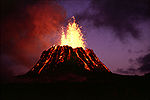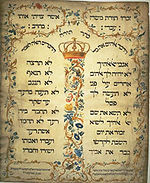Portal:Judaism/Weekly Torah portion/Vaetchanan

Moses pleaded with God to let him cross over and see the land on the other side of the Jordan River. But God was wrathful with Moses on account of the Israelites and would not listen, telling Moses never to speak of the matter again. God directed Moses to climb the summit of Pisgah and gaze about to look at the land. And God told Moses to give Joshua his instructions and imbue him with strength and courage, for Joshua was to lead the people and allot to them the land.
Moses exhorted the Israelites to heed God's laws, not to add anything to them, and not to take anything away from them, so that they might live to enter and occupy the land that God was giving them. Moses noted that in the sin of Baal-peor, God wiped out every person who followed Baal-peor, while preserving alive those who held fast to God. Moses argued that observing the laws faithfully would prove to other peoples the Israelites’ wisdom and discernment, for no other great nation had a god so close at hand as God, and no other great nation had laws and rules as perfect as God’s.

Moses urged the Israelites to take utmost care not to forget the things that they saw, and to make them known to their children and children's children: How they stood before God at Horeb, the mountain was ablaze with flames, God spoke to them out of the fire, and God declared to them the Ten Commandments. At the same time, God commanded Moses to impart to the Israelites laws for them to observe in the land that they were about to occupy.

Because the Israelites saw no shape when God spoke to them out of the fire at Horeb, Moses warned them not to make for themselves a sculptured image in any likeness whatever — the form of a man, woman, beast, bird, creeping thing, or fish. And when they looked up and saw the Sun, Moon, stars, and heaven, they were not to be lured into bowing down to them or serving them, for God allotted those things to other peoples, but God took the Israelites and brought them out of Egypt to be God’s very own people.
Moses said that God was angry with him on account of the Israelites, and God swore that Moses would not enter the land but would die in the land east of the Jordan. Moses cautioned the Israelites not to forget the covenant that God concluded with them, and not to make a sculptured image, for God is a consuming fire, an impassioned God.
Moses called heaven and earth to witness against the Israelites that should they make for themselves a sculptured image when they were in the land, then God would scatter them among the peoples, leaving only a scant few alive. There in exile they would serve man-made gods of wood and stone, that would not be able to see, hear, eat, or smell. But when they were in distress and they searched for God with all their heart and soul, returned to God, and obeyed God, then they would find God, even there. For God is a compassionate God, Who would not fail them, let them perish, or forget the covenant that God made with their fathers.
Moses invited the Israelites to consider whether in any time or space any people had ever heard the voice of a god speaking out of a fire and survived, or any god had taken one nation from the midst of another by prodigious acts and awesome power as their God had done for them in Egypt before their very eyes. Moses said that it had been clearly demonstrated to them that the Lord alone is God and there is none beside God. Moses thus admonished them to observe God’s laws and commandments, which Moses enjoined upon them that day, that it might go well with them and their children, and that they might long remain in the land that God was assigning to them for all time.
Then Moses set aside three cities of refuge on the east side of the Jordan to which a manslayer who unwittingly slew a person without having been hostile to him in the past could escape and live: Bezer among the Reubenites, Ramoth in Gilead among the Gadites, and Golan in Bashan among the Manassites.
Moses summoned the Israelites and called on them to hear the laws and rules that he proclaimed that day, to study them and observe them faithfully. At Horeb, God made a covenant with them — not with their fathers, but with them, the living, every one of them. God spoke to them face to face out of the fire on the mountain. Moses stood between God and them to convey God’s words to them, for they were afraid of the fire and did not go up the mountain. God said the Ten Commandments:

- “I the Lord am your God.”
- “You shall have no other gods beside Me. You shall not make for yourself a sculptured image, any likeness of what is in the heavens above, or on the earth below, or in the waters below the earth. You shall not bow down to them or serve them.”
- “You shall not swear falsely by the name of the Lord your God.”
- “Observe the Sabbath day and keep it holy.”
- “Honor your father and your mother.”
- “You shall not murder.”
- “You shall not commit adultery.”
- “You shall not steal.”
- “You shall not bear false witness against your neighbor.”
- “You shall not covet your neighbor's |wife. You shall not crave your neighbor's house, or his field, or his male or female slave, or his ox, or his ass, or anything that is your neighbor's.”
God spoke these words to the whole congregation at the mountain, with a mighty voice out of the fire and the dense clouds, and God inscribed them on two tablets of stone, which God gave to Moses. When the Israelites heard the voice out of the darkness and saw the mountain ablaze with fire, the tribal heads and elders asked Moses to hear all that God had to say and then tell the people, and they would willingly obey.


And Moses imparted God’s instruction, the Shema and V'ahavta, saying: “Hear, O Israel: the Lord our God, the Lord is one. And you shall love the Lord your God with all your heart, and with all your soul, and with all your might. And these words, which I command you this day, shall be upon your heart; and you shall teach them diligently to your children, and shall talk of them when you sit in your house, and when you walk by the way, and when you lie down, and when thou rise up. And you shall bind them for a sign upon your hand, and they shall be for frontlets between your eyes. And you shall write them upon the doorposts of your house, and upon your gates.”
Moses exhorted the Israelites, when God brought them into the land and they ate their fill, not to forget the God who freed them from bondage in Egypt, to revere and worship only God, and to swear only by God’s name. Moses warned the Israelites not to follow other gods, any gods of the people about them, lest the anger of God blaze forth against them and wipe them off the face of the earth. Moses warned the Israelites not to try God, as they did at Massah, but to keep God’s commandments and do what is right in God’s sight, that it might go well with them, that they might be able to possess the land, and that all their enemies might be driven out before you them. And when their children would ask the meaning of the commandments, they were to answer that they were slaves to Pharaoh in Egypt, and God wrought before them marvelous and destructive signs and portents, freed them with a mighty hand to give them the land, and then commanded them to observe all these laws for their lasting good and survival.
Moses told the Israelites that when God brought them to the land and dislodged seven nations before them — the Hittites, Girgashites, Amorites, Canaanites, Perizzites, Hivites, and Jebusites — the Israelites were to doom them to destruction, grant them no terms, and give them no quarter. The Israelites were not to intermarry with them, for they would turn the Israelites' children away from God to worship other gods, and God’s anger would blaze forth against the Israelites and wipe them out. The Israelites were to tear down their altars, smash their pillars, cut down their sacred posts, and consign their images to the fire.
The Israelites were a people consecrated to God, and God chose them from all the peoples on earth to be God’s treasured people. God chose them not because they were the most numerous of peoples, but because God favored them and kept the oath God made with their fathers. Moses told them to note that only God is God, the steadfast God who keeps God's covenant faithfully to the thousandth generation of those who love God and keep God’s commandments, but who instantly requites with destruction those who reject God.
Hebrew and English text
Hear the parshah chanted
Commentary from the Ziegler School of Rabbinic Studies at the American Jewish University (Conservative)
Commentary from the Jewish Theological Seminary of America (Conservative)
Commentary by the Union for Reform Judaism (Reform)
Commentaries from Project Genesis (Orthodox)
Commentaries from Chabad.org (Orthodox)
Commentaries from Aish HaTorah (Orthodox)
Commentaries from the Jewish Reconstructionist Federation (Reconstructionist)
Commentaries from My Jewish Learning (trans-denominational)
